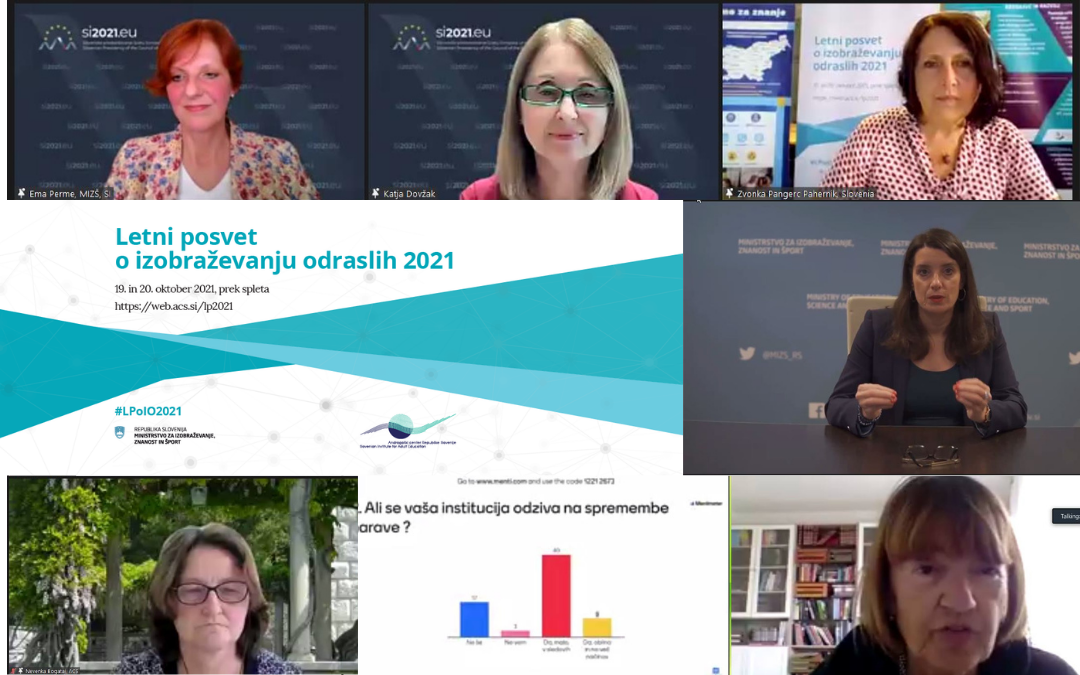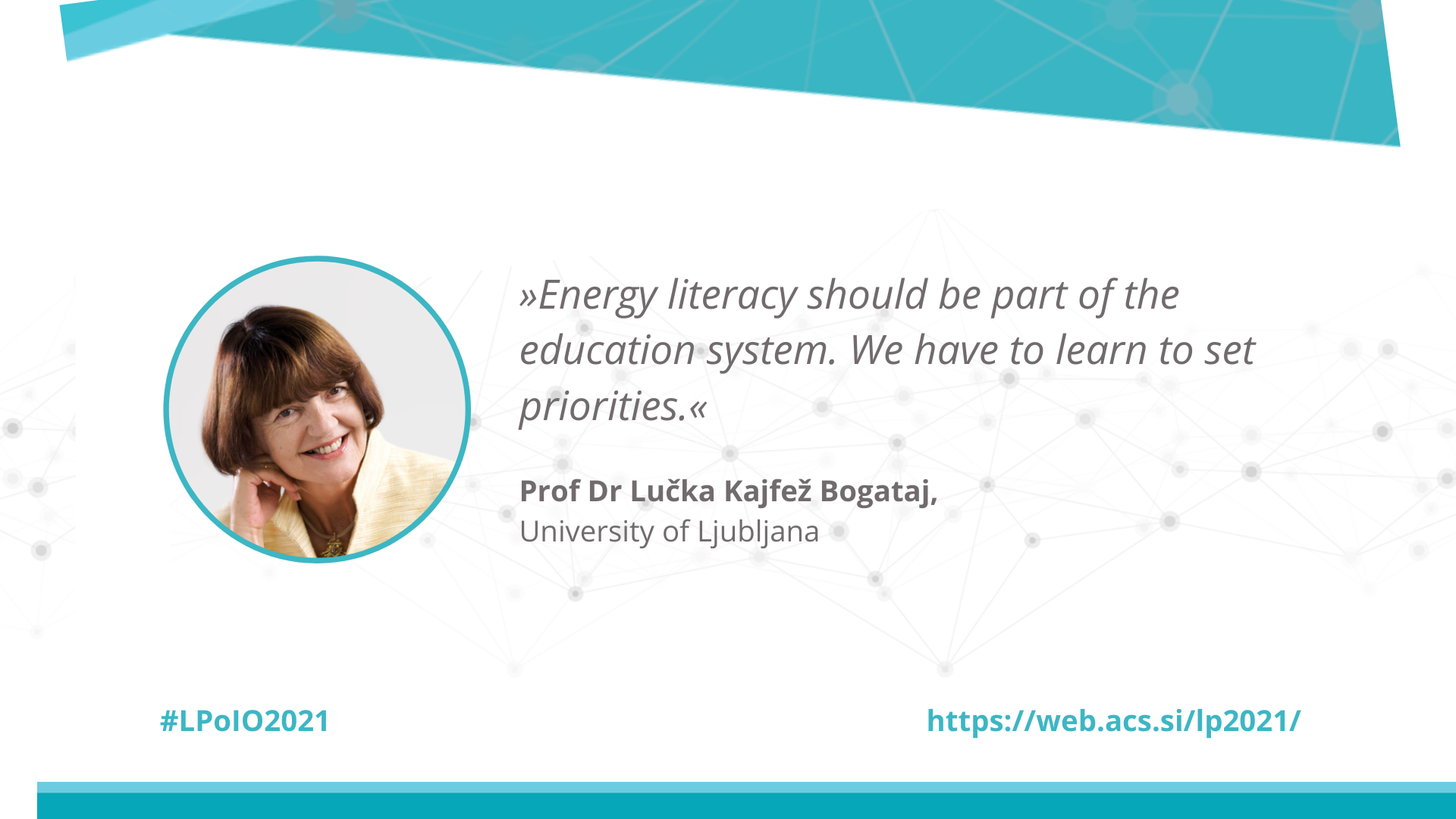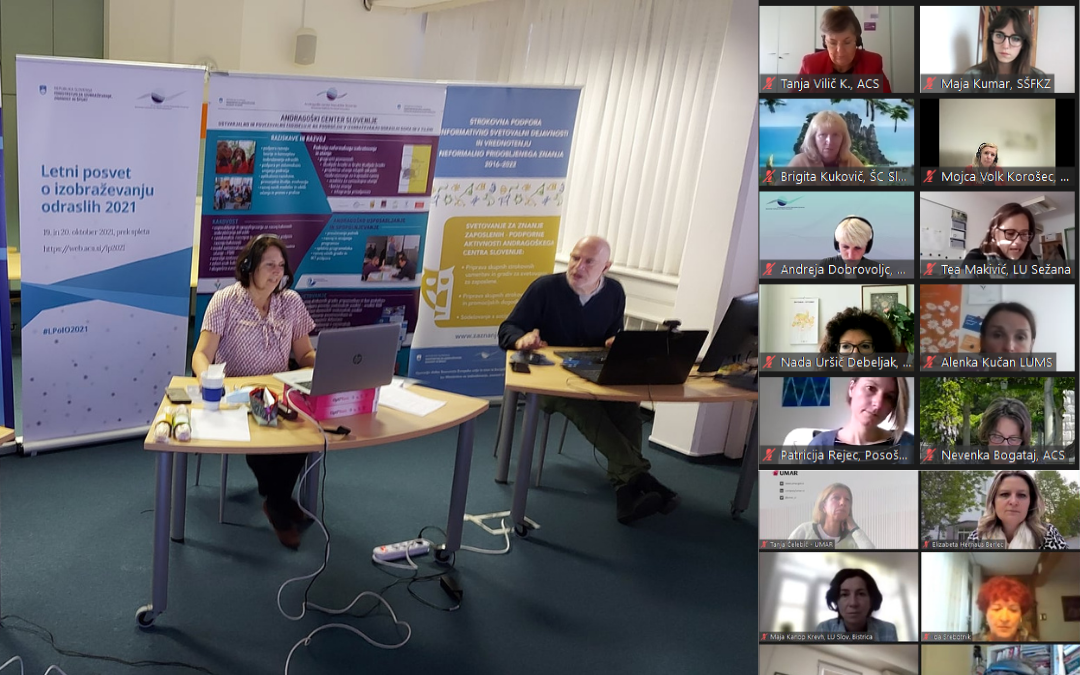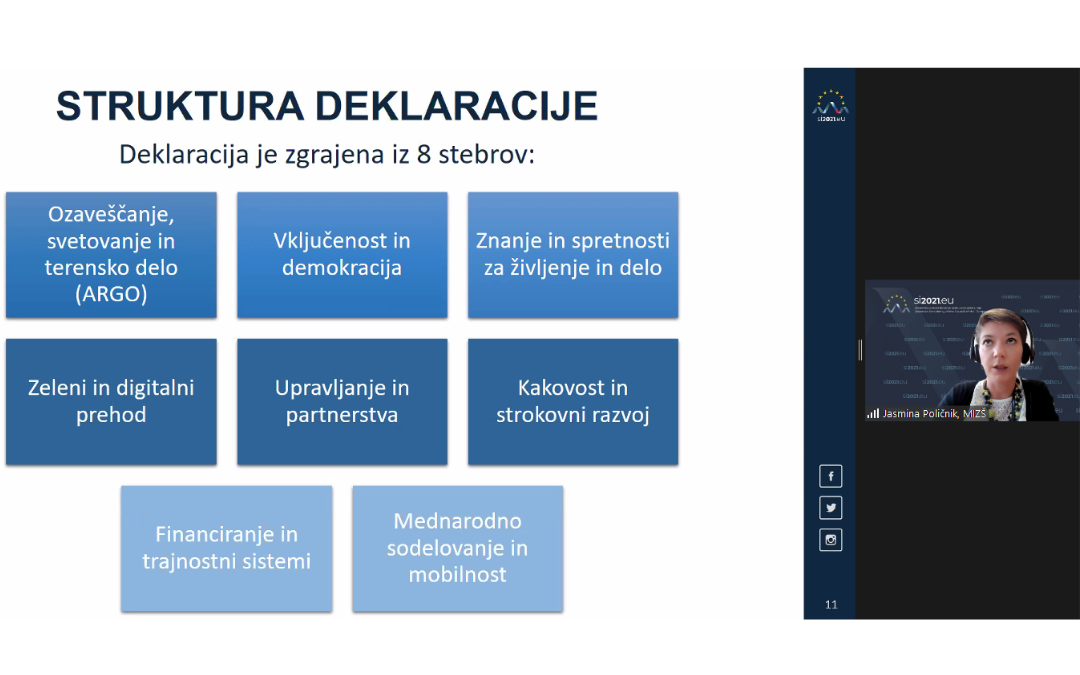AAEC 2021 attracted 327 ALE supporters online, who attended the first or second or, in most cases, both days (19 and 20 October) of this traditional professional meeting. On the website of the conference, videos of contributions are available (in Slovenian).
There is no more time to joke around!
And there is no vaccine against the damage caused quietly and uncontrollably by our wasteful way of life. There are no masks to protect us from global pollution, drought on the one hand and abundance of water on the other, from changes around us and in us. That is the spirit in which I experienced the relentless words of our plenary speaker Dr Lučka Kajfež Bogataj. A climate researcher recognised in the world and Slovenia, an advocate of adequate environmental protection, a co-recipient of the 2017 Nobel Peace Prize …, asked herself for all of us how to survive/live on a planet that does not grow. She says that the destiny of the planet is in our hands. The ‘take-do-distribute-use-discard’ mentality does not lead to growth but spirally increases the consumption of natural resources. And although the situation is becoming increasingly urgent, crises are intertwined, and they do not seem to have a beginning or an end, Lučka still believes that changes can be made.
She mentions the importance of raising awareness about significantly less wasteful behaviour and consumption. She is committed to energy literacy and active citizenship and believes that both skills can be acquired and constantly upgraded through lifelong learning – of everyone, especially decision-makers! As a rule, they are not sufficiently qualified to decide on such important matters, as they do not know them, so the question is how to involve them in awareness-raising and training subtly. She mentions the European Green Deal and its concretisation – the Fit for 55 package (a call to reduce emissions by at least 55% by 2030). She also mentions the climate conference in Glasgow, where in early November, more than 100 heads of state pledged, among other things, also to reverse the deforestation trend by 2030. It is the forests where Lučka sees Slovenia’s comparative advantage. I believe that the next AAEC speaker, Dr Nevenka Bogataj (SIAE), feels the same.
In her contribution, she highlighted the importance of experiential knowledge in local communities. She sees the solution in the coherence of sociological and environmental approaches. She, too, has ‘active citizenship’ in mind, even though she uses a milder expression. She highlights a model of circular economy (symbiocene) based on values such as cohabitation, cooperation, coexistence, etc. However, she calls for a transition from half-hearted to tumultuous responses that bring immediate effects. As did speakers at the forum on the Green Transformation of Society (with Boštjan Videmšek as the main speaker) a week before, Nevenka also affirms the importance of acquiring knowledge and skills for sustainable development through non-formal adult learning. Of course, also mentioned were study circles that have been operating in the described ways for 30 years and for the development of which she takes exemplary care.
About adult education at a (forced) distance
The content set that followed was also exciting, i.e. presentation of the second phase of the ALE system response to covid-19. This time it was no longer just a reaction to unknown conditions like it was in the spring/summer of 2020. Dr Tanja Možina carried out the evaluation study at the request of MESS, and she also presented it at the conference. It expresses the spirit of proactivity and innovation and the determination of educators in the AECs, secondary schools and third age universities to include the good sides of the unpleasant situation in the further development of the ALE profession. Attention will need to be focused on a range of things – planning, awareness-raising, appropriate ICT and didactic tools, qualification of providers, the role of guidance and much more. Support is crucial – technical, but above all, human. The main challenge is to overcome the barriers faced by vulnerable groups, which have been affected the most by the pandemic.
Jasna Kržin Stepišnik, MSc, told us how ALE was carried out in secondary vocational schools during the pandemic. Most of the problems were with practical training, which simply cannot be carried out at a distance. Her contribution, supported by Nives Počkar from the National Association of Secondary School Principals, expressed an appeal for the ministry to take better care of secondary schools and school centres through better legal/systemic regulation, including funding and staffing.
A new strategy is on the horizon – it will affect our work as early as 2022
In the concluding part of the first day, Katja Dovžak, MSc, and Ema Perme, coordinators of the preparation of the Resolution on AEMP 2021–2030 at MESS, spoke about the strategy that will soon be addressed by the Government of the Republic of Slovenia and adopted by the National Assembly. Its purpose is lasting: to increase the involvement of adults in various forms of learning and education and thus ensure a healthy, competent, satisfied society and individual. They also highlighted the specifics of the new period – a strong emphasis on the green and digital transition and the connection with the European umbrella documents that dictate high goals (e.g. 60% annual participation of adults in learning and education by 2030 – according to The European Pillar of Social Rights Action Plan). We learned a lot from the previous stages of preparing the national programme as well as other processes, e.g. cooperation with the OECD in developing a national skills strategy. The Resolution emphasises the importance of effective management of the ALE system and, without a doubt, a great deal of effort will be devoted to this.
The directors-general – Nataša Kranjc, MSc, from MESS and Mojca Pršina from the MLFSA discussed the orientations in 2022 of both line ministries. The discussion of five directors and other representatives of public institutions and five ALE associations that followed was about priorities, mutual expectations for support and opportunities for synergy. From their initial presentations, we can conclude that plenty of good has been achieved (e.g. public service in ALE), but they also face many development challenges. One of the most highlighted is the question of how to maintain employment at educational institutions and, of course, participants with the ESF projects coming to an end. There are indications that a gap will soon arise and it should be filled as quickly as possible, even better – prevent it. An essential factor in this is the Government Office for Development and European Cohesion Policy, which carries out negotiations with the European Commission. Maja Grašič from the MLFSA and Teja Dolgan from MESS ensured that they are working closely with them and strive for a smooth transition to a new phase of using funds from the European Cohesion Policy 2021–2027 while implementing also the Recovery and Resilience Facility.
Although each institution has its specific tasks and target groups, an extremely strong need for networking and collaboration was expressed, but before that, for better knowledge of each other’s activities. Also, many speakers called for the implementation of integrated approaches that consider the personal, community and work dimensions of ALE. On the other hand, they emphasised the importance of adapting to the users – participants, so that they will become aware of how their whole life can be turned around through guidance, information, evaluation of existing knowledge as well as learning and education. Also, in this set, the already mentioned appeal of the representative of ALE at secondary schools or school centres was highlighted. SAEA competed for more equal treatment and increased funds in the annual tender. The Slovenian Third Age University representative pointed out the rebuilding of relations as their priority, as Covid-19 affected their target group very much.
Thanks to the Slovenian presidency of the EU Council, adult education has attracted a lot of attention
The Slovenian Presidency of the EU Council in the second half of 2021 put the ALE at the forefront of political and professional efforts. The MESS was responsible for drafting a NEAAL (EAAL 2021–2030). This complex professional-political process took place in cooperation with stakeholders at the national and European level. Jasmina Poličnik from MESS reported on this and the European Conference on Adult Learning and Education held in September. She announced that the Council of European Ministers of Education would adopt the NEAAL on 29 November. She also drew attention to the views of the profession, published in the Declaration on Adult Learning and Education by 2030 in EU.
Some activities were closely related to ALE or lifelong learning during the presidency also at the MLFSA. Katja Rihar Bajuk, MSc, spoke about the conference Quality Work for the Quality of Life. All the speakers there highlighted the importance of the continuous acquisition of knowledge and skills for all aspects of work and life in general. We have already written about these three efforts in the Newsletter SIAE.
In September 2021, the Eurydice study on adult education and training was published, which Saša Amrožič Deleja from MESS addressed at the conference. The publication provided comparative data and contextual highlights of 42 European countries. It is an excellent source for decision-making and professional work, as well as perhaps a reminder that the preparation of national data for such studies needs to be better coordinated!
The participation of Ana Stanovnik Perčič from CMEPIUS is almost a constant at AAEC. Erasmus+ projects, as well as the EPALE portal, are always a source of new ideas, validation among equals at the European level and – not insignificantly – of funds. Ana spoke about the opportunities and invited us to apply for tenders, publish in EPALE and participate in other forms of international cooperation.
In conclusion
The AAEC 2021 virtual stand, at the end of the event, was a welcome contribution in itself, although closely related to the first content set – sustainable development. Three wise young women, their colleagues and participants from Ajdovščina, Postojna and Tolmin shared their views on sustainable development, the role of ALE, their activities, initiatives and achievements with the most persistent participants of the conference. The videos (in Slovenia), the fruit of Darijan Novak’s (SIAE) film creativity, are inspiring – watch them here!
Although shorter in time than the previous live meetings, the conference fulfilled us, maybe even tire us a little. There was talk about many things; now, actions are needed. Next year at the same time we will meet in person in Portorož; we made a firm promise of that.
Zvonka Pangerc Pahernik, MSc (zvonka.pangerc@acs.si), SIAE






